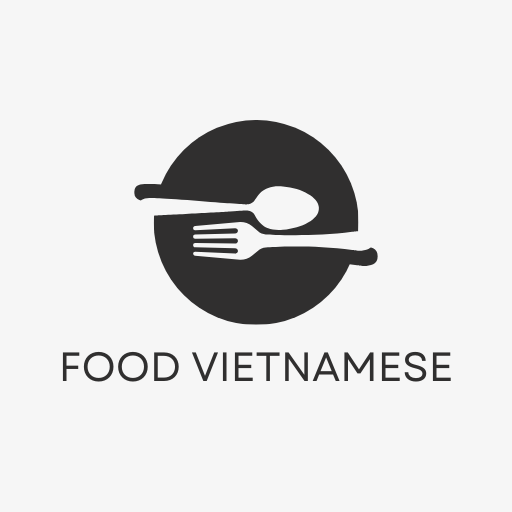Chè Thái is not only a popular dessert in Vietnam but also a favorite treat because of its wonderful blend of flavors. With sweet lychee, chewy jackfruit, crunchy jelly, and creamy coconut milk, it’s the perfect summer refreshment.
As the name suggests, Chè Thái originates from Thailand. When it arrived in Vietnam, it was adapted to suit Vietnamese tastes and preferences. Making Chè Thái is simple enough for anyone to do at home. This article will guide you to successfully make Chè Thái on your first try.
About Vietnamese Thai Dessert
Chè is a term used to describe a dessert that can be liquid or jelly-like. Essentially, Chè Thái is a Vietnamese version of a fruit cocktail served with coconut milk. This dessert is inspired by a Thai dessert called tub tim krob, hence the name.
Chè Thái is very popular in Vietnam and some other countries around the world. It is usually served in plastic or glass cups. Connoisseurs consider it a perfect summer refreshment. The preparation of this dessert is straightforward; you just need to cut the fruit, add jelly, pour in coconut milk and ice, and you’re done—no complicated cooking required.
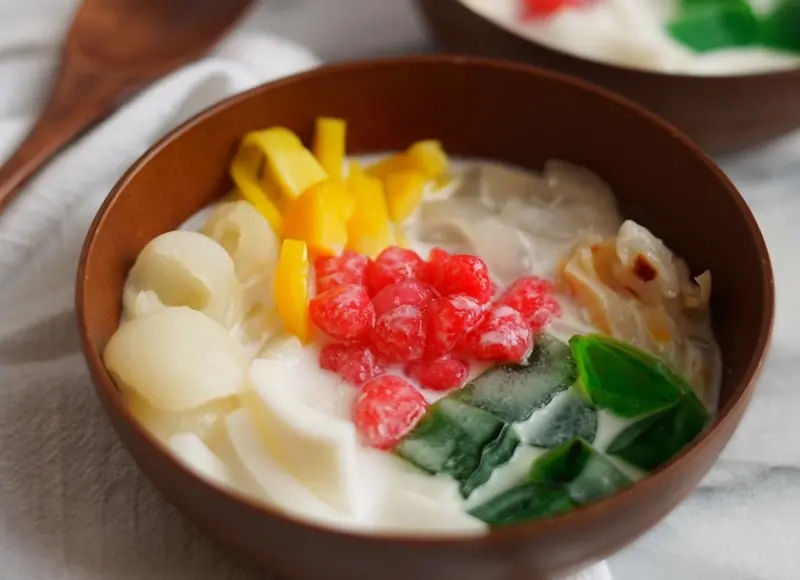
Ingredients for Making Chè Thái
To make Chè Thái for four people, you will need the following ingredients:
- For the water chestnut rubies: 100g peeled water chestnuts, red food coloring, 100g tapioca starch, water, ice.
- Pandan jelly: 1 bunch of pandan leaves, sugar, 1 packet of agar powder, water.
- Chè Thái: 200g jackfruit, 200g lychee, 200g longan, 200g coconut jelly, 200g coconut milk.
Simple Chè Thái Recipe
Here are the easy steps to make Chè Thái that anyone can follow:
Steps to Make Water Chestnut Rubies
- Peel and wash the water chestnuts, then dice them.
- Place the diced chestnuts in a large bowl, add a few drops of red food coloring, and mix well to coat completely. Be careful not to leave excess water at the bottom to prevent clumping of tapioca starch.
- Add a cup of tapioca starch to the bowl and mix until the chestnuts are evenly coated.
- Pour the mixture into a sieve to remove excess starch to avoid thickening the water during boiling.
- Boil 1 liter of water over medium heat, add the chestnuts in small batches to boil, stirring to prevent sticking. Once they float, remove them and place them in an ice water bath, stirring again.
- Soak the rubies in cold water for about 10 minutes.
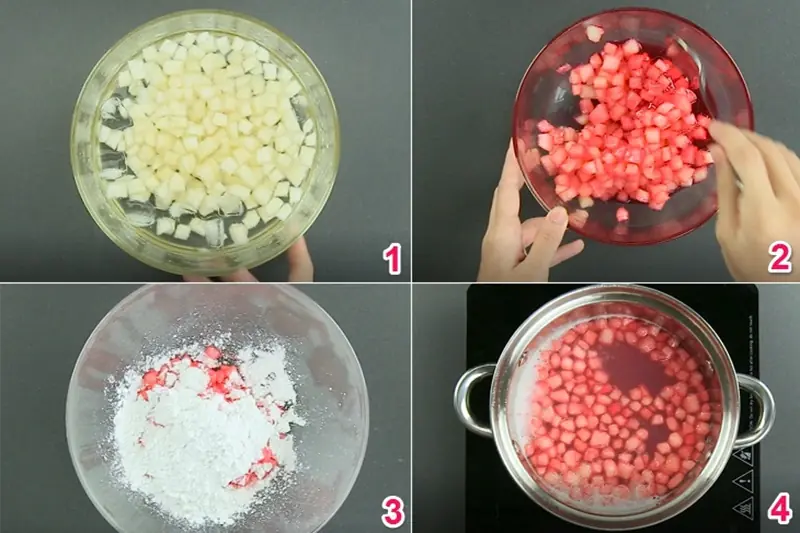
Steps to Make Pandan Jelly
- Blend pandan leaves with 200ml of water, strain to get the green pandan juice.
- Dissolve the agar powder with 100g sugar and pandan juice.
- Boil 1 liter of water, slowly pour in the pandan agar mixture while stirring continuously to prevent clumping.
- Once it reaches a gentle boil, turn off the heat.
- Pour the jelly into a tray or mold, let it cool, refrigerate until set, then cut into cubes or long strips.
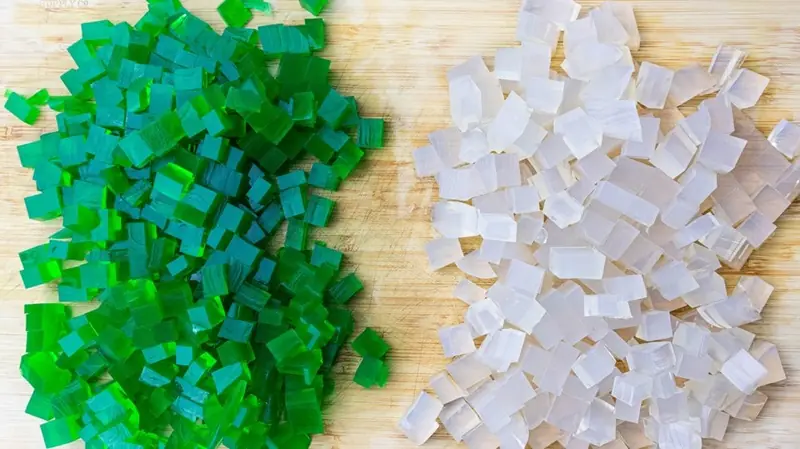
Ảnh 3. Cắt thạch lá dứa thành miếng nhỏ vừa ăn
Steps to Make Chè Thái
- Slice the jackfruit into long strips, and cut the lychee into large pieces.
- Combine all the fruit, pandan jelly, and water chestnut rubies in a bowl.
- Mix coconut milk with canned fruit juice (optional), pour over the fruit mix, and stir well.
- Chill the mixture in the refrigerator for a few hours or add ice and enjoy.
Nutritional Value of Chè Thái
The refreshing, sweet taste of Chè Thái is perfect for hot summer days. Many might not know that this dessert is both delicious and nutritious. Each serving of Chè Thái provides about 400 calories, along with fats, proteins, carbohydrates, and fiber. This makes some people on a diet or weight loss regime wonder if eating Chè Thái will lead to weight gain.
Nutrition experts state that an adult requires 2000 calories per day to maintain their daily activities. Thus, each meal should provide about 667 calories to sustain energy. Therefore, one serving of Chè Thái will not cause weight gain, but consuming too much in a short time could lead to excess calories, stored as fat, and result in weight gain.
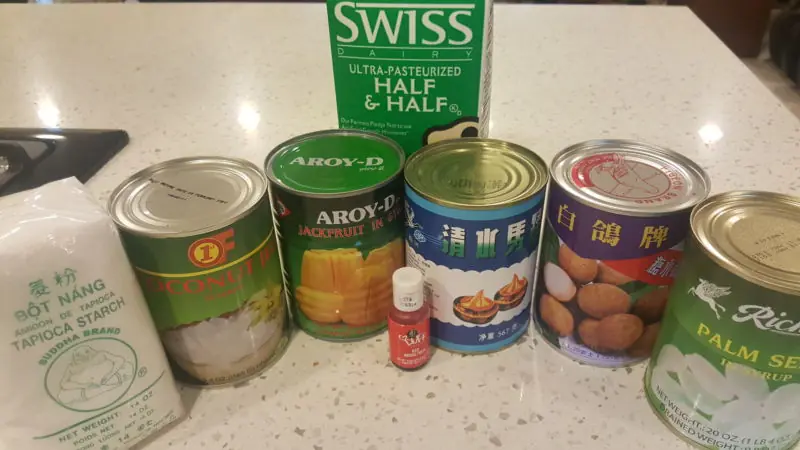
Additionally, coconut milk, an essential ingredient in Chè Thái, provides a significant amount of fat. Therefore, consider these tips to enjoy Chè Thái deliciously and healthily:
- Avoid eating Chè Thái at night or before bedtime to prevent fat accumulation, as the body does not burn energy efficiently during rest.
- Limit to one serving per meal and no more than three times a week to avoid excessive calorie and sugar intake.
- Reduce sugar and coconut milk in Chè Thái, as they are the main contributors to increased energy intake. You can substitute sugar with low-fat milk or palm sugar when preparing Chè Thái.
Hopefully, these insights have helped you learn how to make authentic Chè Thái. With about 20 minutes of preparation and 10 minutes of execution, you can create a refreshing dessert for your family. For more dessert recipes, visit Foodvietnamese.com!
